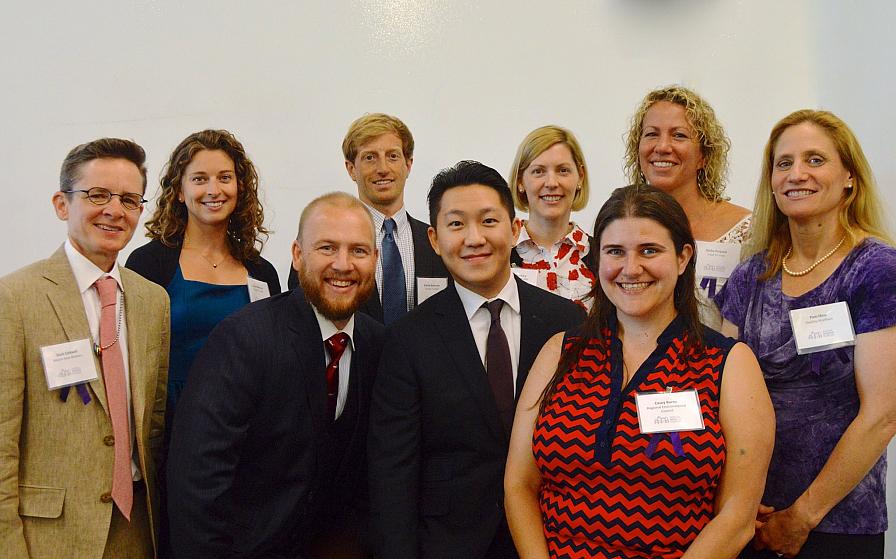
On Thursday, June 23 more than 90 philanthropists, business leaders, nonprofit professionals, and community members gathered at District Hall for Solutions for a Sustainable Community, the culminating pitch event of the Social Innovation Forum’s pilot Boot Camp program.
Eight nonprofit leaders gave three-minute presentations on the work their organizations are doing to make greater Boston greener and more sustainable. Some highlights of the event:
- Lauren Belmonte of Change is Simple shared her organization’s work partnering with schools to deliver fun, interactive lessons on environmental sustainability to young children, thereby transforming students from bystanders to mindful participants in creating more sustainable, healthier world. Read the prospectus >>
- According to Jennifer Hashley, Director of New Entry Sustainable Farming Project, “we need more boots in the dirt” in New England. Jennifer highlighted the organization’s approach to creating new pathways to farming careers to help replace an aging farm workforce and preserve farmland in Massachusetts. Read the prospectus >>
- Neil Anderson of the Friends of the Middlesex Fells Reservation encouraged the audience to come “take a hike with us” in this 3,400-acre urban wilderness just north of Boston. From programming for families and students to volunteer opportunities for those interested in keeping the Fells clean, beautiful, and safe, there are many ways to get involved in this nature oasis right outside the city. Read the prospectus >>
- Casey Burns of Regional Environmental Council highlighted the role that price and proximity play in determining a person’s ability to access healthy food. In Worcester, Regional Environmental Council has developed mobile farmers markets and community and school gardens to help bring healthy food to the community. Read the prospectus >>
- Edward Hsieh of Mass Recycle told the audience, “In one week the average citizen could collect enough plastic to make a polar fleece.” Through its advocacy, education, and innovation, Mass Recycle is working to increase recycling and reduce waste in Massachusetts – an important task given that by 2020 the state will run out of landfill space. Read the prospectus >>
- Healthy Waltham’s Executive Director Pam Hess shared her organizations work to promote healthy lifestyles and well-being for families and underserved populations in Waltham through several programs, including the “Fresh! Chef-to-School Program” with a traveling chef at all Waltham elementary schools. Read the prospectus >>
- Duck Caldwell of Boston Area Gleaners informed the audience that up to 20% of farm food doesn’t get harvested. Gleaners has been doubling pounds of food “gleaned” year over year, rescuing surplus quality produce and partnering with food pantries and meal programs to ensure it gets to those who are hungry and helps farmers keep their farms healthy and profitable. Read the prospectus >>
- Sasha Purpura of Food for Free shared the sobering statistic that 40% of US food goes to waste. As the nation’s first food rescue organization, Food for Free is at the forefront of getting this food to those who need it most (and is partnering with others like Boston Area Gleaners!). According to Sasha, “The next wave of food rescue is prepared food.” Read the prospectus >>
The event, which included ample time for networking, was designed to bring together practitioners in the field of sustainability and those who are interested in these issues and want to learn how they can help.
It’s really hard to sit at your desk and want to change the world.
“It’s really hard to sit at your desk and want to change the world,” said Susan Musinsky, the Social Innovation Forum’s Executive Director, emphasizing the role that this event – and others like it – play in giving people a pathway to become involved in issues they care about. “Talk to the presenters. Take the literature. Go on their websites. Call your neighbor and tell them what you’ve learned.”
Social Innovation Forum (SIF) partnered with the Schrafft Charitable Trust to pilot a nine-week Boot Camp Pilot program for innovative nonprofit organizations working in the field of environmental sustainability. The program was designed to help participating organizations, who work on a variety of issues, including food justice, food rescue/insecurity, preservation of open spaces, recycling, and environmental education, to increase their visibility, expand their networks, and improve their organizational capacity. The Boot Camp included weekly workshops led by SIF staff and experienced business and nonprofit leaders, as well as one-on-one mentoring with “coaches” recruited from SIF’s network of supporters. In addition to the pitch, each organization created a two-page “prospectus” to share its work and plans for growth.
 Social Innovation Forum
Social Innovation Forum